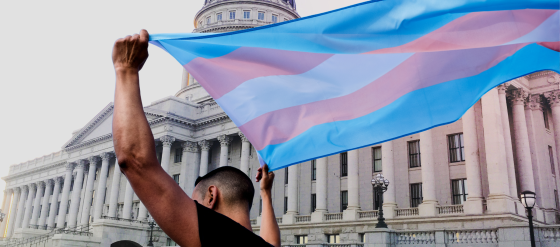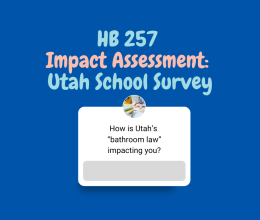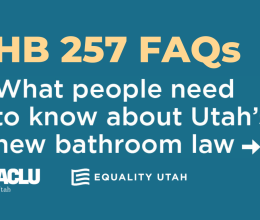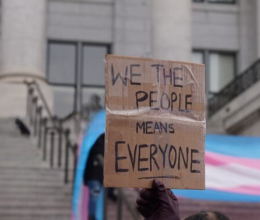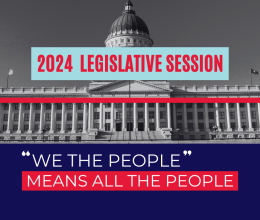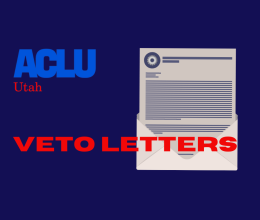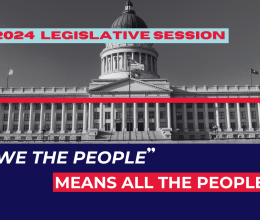
Student Rights, Free Expression, LGBTQ Equality - On October 6, 2000, the Salt Lake City School Board reversed the most extreme steps taken anywhere in the country against gay-supportive student clubs when it decided to change its policy and allow the clubs to meet at school. This decision ended nearly five years of controversy as well as two ACLU of Utah lawsuits brought on behalf of students who had sought to form gay-supportive student clubs at East High School, and it finally gave students access, on a non-discriminatory basis, to important non-curricular clubs that had been banned since 1996.
It is due to the incredible courage of the student plaintiffs and other members of the East High Gay/Straight Alliance and PRISM Club that the Salt Lake City School District is now a forum in which students can express gay-positive viewpoints and help create a safer school environment for lesbian and gay youth.
Background: East High Gay/Straight Alliance v. Board of Education
The conflict began in 1995 when a group of students at East High School attempted to form a school club called the Gay/Straight Alliance (GSA). Its purpose, like that of hundreds of other similar clubs that have long been meeting in schools across the country, was to provide a safe and welcoming forum in which students could discuss important issues facing lesbian and gay youth. The East High GSA was no different than other high school student-initiated groups, all of which are protected by the 1984 Equal Access Act (EAA), mandating that any school that receives federal funding and has some non-curricular clubs must give all non-curricular clubs equal access to the school’s resources.
Unfortunately, the Salt Lake City School District did not want to allow the GSA to meet. In order to block student speech it considered offensive and, at the same time, maintain compliance with the EAA, in February 1996, Salt Lake City became the first school district in the country to take the drastic step of banning all student clubs not related to the curriculum. In response, in March 1998, the ACLU of Utah, along with cooperating attorneys Laura Milliken Gray and Marlin Criddle, the ACLU of Northern California, Lambda Legal Defense and Education Fund, and the National Center for Lesbian Rights, filed a lawsuit on behalf of GSA members Keysha Barnes and Ivy Fox, arguing that the district’s actions violated the EAA since some non-curricular student groups were still allowed to meet. Our complaint also charged that the district’s policy regarding school clubs was evidence of a broader, unwritten, but very real policy prohibiting the expression of gay-positive viewpoints in any school setting, and it therefore violated the students’ First Amendment rights as well.
In October 1999, U.S. District Judge Bruce Jenkins agreed with us that the district violated the EAA during the 1997-98 school year when it did not allow the GSA to meet on the same terms and conditions as another East High non-curricular club (click here to view Judge Jenkins’s October opinion). In a November 1999 pre-trial hearing, the district stated in no uncertain terms that students have a First Amendment right to express gay-positive views in approved school groups. For the first time, the district referred to an administrative rule issued in May 1999 by the State Office of Education prohibiting discrimination against students and teachers on the basis of sexual orientation. This policy is an extremely significant consequence of our lawsuit, and the new state policy is a help to administrators, teachers, and students who wish to create a forum for gay-positive viewpoints that will counter the overwhelmingly negative atmosphere that lesbian and gay youth often face (click here to view Judge Jenkins’s November Judgment and Order of Dismissal).
In December 1999, we appealed the court’s decision regarding the EAA, arguing that the test Judge Jenkins relied upon to determine whether a student club related to the curriculum was so broad that practically any club the school board deemed acceptable could be defined as curricular. Our appeal to the 10th Circuit Court was supported by an amicus curiae brief from the American Counseling Association, the National Association of School Psychologists, the National Association of Social Workers, and the School Social Work Association of America. These organizations emphasized the importance of GSAs in public schools as a way to meet the very real needs of lesbian and gay students. The Asian American Legal Defense and Education Fund, the Hispanic Bar Association of the District of Colombia, the National Asian Pacific American Legal Consortium, and the National Organization for Women Legal Defense and Education Fund also submitted an amicus brief in which they stressed that non-curricular clubs benefit all students, and that policies such as that adopted by the Salt Lake City School District are particularly damaging to minority students. Now that non-curricular clubs are once again allowed in the Salt Lake City School District, we have withdrawn our appeal.
Background: East High School PRISM Club v. Cynthia L. Seidel
Despite the fact that the Salt Lake City School District acknowledged in 1999 that students have the First Amendment right to express gay-positive viewpoints in approved student clubs, on March 1, 2000, Assistant Superintendent Cynthia Seidel, the school official responsible for approving student clubs, rejected the application of a group that wanted to provide students with the opportunity to do just that. The PRISM Club, which stands for People Respecting Important Social Movements, sought to extend and enhance the study of curricular subjects such as American Government and Law, U.S. History, and Sociology, by “talk[ing] about democracy, civil rights, equality, discrimination and diversity” through the perspectives of lesbians and gay men.
In the PRISM Club’s application, the students outlined an organization that fit the district’s definition of curriculum-related student groups in that its subject matter was taught in the school curriculum and its activities provided an “extension and reinforcement, application, and practice of curricular content.” After reviewing the clubs that Seidel had approved, it was clear that in rejecting the PRISM Club’s application, she had misapplied district standards for giving students access to the resources available to curricular clubs. And, through her inconsistent application of these standards, she effectively silenced gay-positive viewpoints in the forum available to student groups, and therefore violated the district’s policy regarding the expression of these views.
In April 2000, the ACLU of Utah, along with cooperating attorney Richard Van Wagoner, the National Center for Lesbian Rights, and Lambda Legal Defense and Education Fund, filed a complaint on behalf of the PRISM Club, the East High Rainbow Club (a similar club whose application had been rejected in 1999), and individual students Jessica Cohen and Margaret Hinckley. The complaint argued that the rejection of the clubs’ applications violated the students’ First Amendment rights to free speech and association as well as district policy. We also filed a preliminary injunction asking that the club be allowed to meet while this issue remained before the court. In an April 26 order, U.S. District Judge Tena Campbell granted the preliminary injunction and found that Seidel did not adhere to the district’s policies in determining that the PRISM club was not sufficiently “curriculum-related.” Thankfully, litigation is no longer necessary now that the Salt Lake City School District has granted club-status to both the GSA and the PRISM Club.
